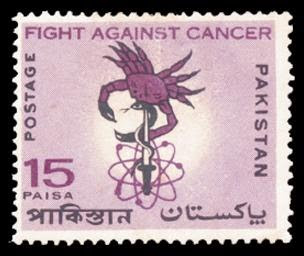 The crab, which is an international sign for Cancer is shown to have been pierced by a sword. The snake round the sword signifies the medical aspect. The electrons in orbit signify atomic radiation—one of the main methods of treatment of cancer. The caption “FIGHT AGAINST CANCER” appears in red at the top of the stamp while the word ‘Pakistan’ in Bengali and Urdu appears in black at the bottom. The denomination figure ‘15’ appears in red just above the word ‘Pakistan’ in Bengali with the word ‘Paisa’ in black underneath. The word ‘Postage’ appears vertically on the left of the stamp in black. The word ‘Pakistan’ in English appears vertically in black at the right side of the stamp.
The crab, which is an international sign for Cancer is shown to have been pierced by a sword. The snake round the sword signifies the medical aspect. The electrons in orbit signify atomic radiation—one of the main methods of treatment of cancer. The caption “FIGHT AGAINST CANCER” appears in red at the top of the stamp while the word ‘Pakistan’ in Bengali and Urdu appears in black at the bottom. The denomination figure ‘15’ appears in red just above the word ‘Pakistan’ in Bengali with the word ‘Paisa’ in black underneath. The word ‘Postage’ appears vertically on the left of the stamp in black. The word ‘Pakistan’ in English appears vertically in black at the right side of the stamp.The commemorative postage stamp will be available for sale on and from the 26th December, 1967 for a period of three months at all important Post Offices, Philatelic Bureaux and Counters and also at some of the Pakistan Diplomatic Missions abroad. Thereafter, if the supplies are still available, they will be sold only at the Philatelic Bureaux and Counters.
Pakistan Post Office is issuing a Postage Stamp of 15 Paisa denomination on December 26, 1967 to focus the attention of the public on the “Fight Against Cancer”.
Today Cancer is a global medical problem. In majority of countries, where causes of death are recorded, cancer ranks second in frequency being exceeded by heart disease. More than two million people die of cancer each year all over the world. Over five million people suffer with cancer at a time. In the absence of accurate statistics, according to a rough estimate, sixty to eighty thousand people suffer with cancer each year in Pakistan. Incidence varies from country to country, but no race, creed or civilisation is immune to this disease. Incidence of cancer in Pakistan though not as high as in some of the western countries but is certainly high enough to demand attention.
Millions of dollars are spent yearly by voluntary and Govern-mental Agencies in research for effective control, and treatment of this menace. In advance countries the efforts are directed towards cancer education along with research being carried out for treatment. In recent years, international collaboration for cancer control has gained momentum and the ‘Fight Against Cancer’ stamp is part of an international programme to promote public awareness of this disease. Many useful lives needlessly lost each year can be saved by public awareness, and proper treatment in time.
The age long belief that cancer is incurable is no longer true. CANCER IS CURABLE provided it is detected early and treated in time. Since the first cancer hospital opening in Rheims in 1740, the progress in this field is tremendous. Innum-erable centres engaged in the field of cancer treatment, education, and research are functioning world over. In Pakistan cancer centres have been opened up in all the major hospitals in both the wings. These centres are being developed, and it is hoped similar centres will be opened up in areas, where the need arises. At the moment, the major centres in East Pakistan are located at Dacca, Chittagong and Rajshahi. In West Pakistan, the cen-tres are located at Lahore, Multan, Hyderabad and Karachi. These centres have been equipped with most modern equipment. The Pakistan Atomic Energy Commission has also set up Medical Radio Isotope Centres, where facilities for early detection and treatment of cancer are available.












No comments:
Post a Comment